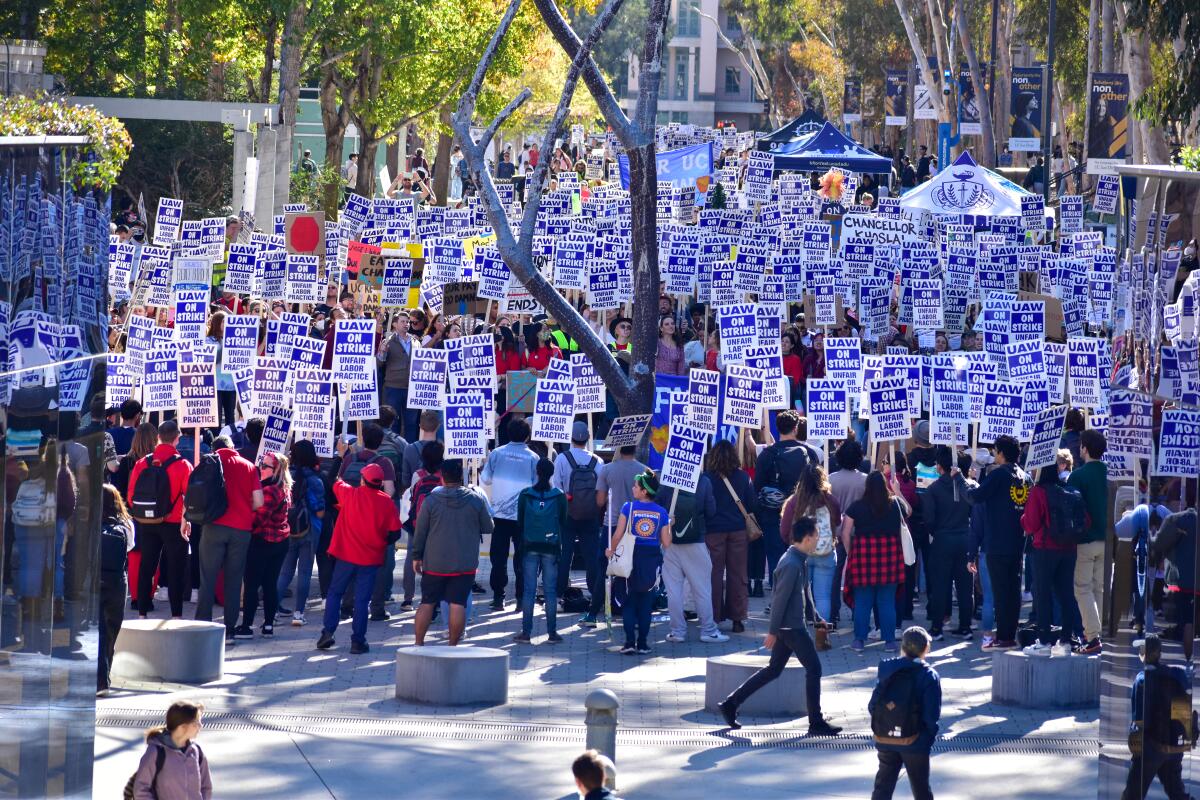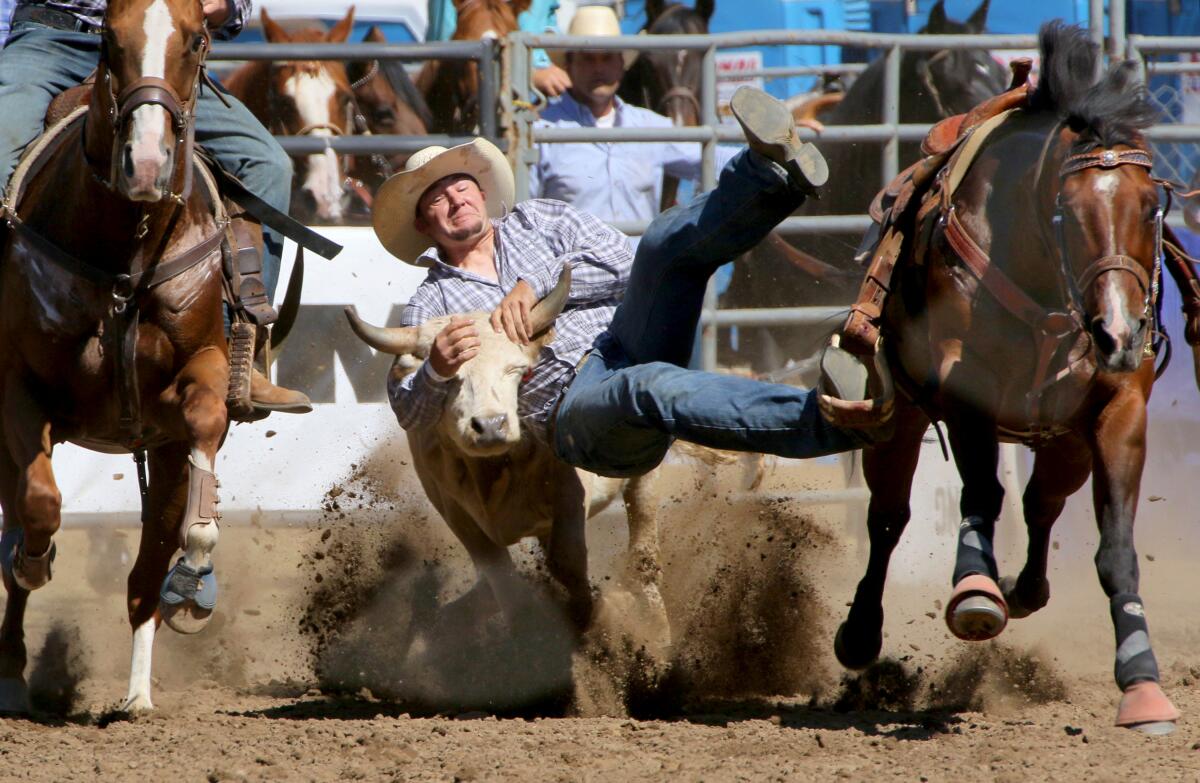Skipping meals to scrape by: A striking UC student worker shares his story

Good morning, and welcome to the Essential California newsletter. It’s Thursday, Dec 8. I’m Ryan Fonseca.
The largest labor strike in the history of U.S. higher education is now in its fourth week.
Roughly 48,000 University of California graduate student workers and academic employees across the system’s 10 campuses are refusing to work as multilayered labor negotiations continue. Last week, postdoctoral scholars and academic researchers reached a tentative agreement with the university system (they account for about a quarter of the striking workforce) but remain on the picket lines in solidarity with fellow workers.
The strike has put a spotlight on wages and working conditions within the UC system as many student workers struggle to find affordable housing and make ends meet.
I wanted to get a sense of what these workers do, and why this strike is so important to them. Luckily, a newsletter reader and PhD student from UC San Diego put me in touch with one of his fellow striking union members, Anoop Praturu.
Anoop is a third-year graduate student researcher (GSR for short) in biophysics at UC San Diego and is working on his doctorate.
The 25-year-old grew up in San Jose and became fascinated with science at a young age. He studied astrophysics at UC Santa Barbara and got a job with a tech startup after graduating but soon decided he’d rather pursue a career in academia.
“Something that caught my eye is that biophysics, as a field, is very young and very new, and so it felt like there’s a lot of potential for growth,” Anoop told me in a phone call from the picket line on his campus.
So what does he work on within biophysics? His current focus is analyzing “genetic signatures of aging and Alzheimer’s disease,” along with the structure of blood vessels and how blood moves through our bodies. One main goal: “understanding how strokes happen in the body [and] the brain, and how they can be treated or mitigated.”
That’s a hefty job. But Anoop says working conditions for UC’s student researchers can be “very, very harsh,” with unjustified firings and long hours without additional compensation.
That was a big driver for him and other workers to organize and vote to form a union, which became Student Researchers United-UAW.
“A lot of people ... were feeling very isolated,” he said, “and feeling like they had no recourse when they were being subjected to these horrible working conditions.”
He reflected on the complex relationship between student workers and the university. They are UC employees but some also pay tuition to study and work there, he said:
We act as teachers, we act as mentors, we act as lab managers. ... We really are the life force that keeps this university running. The idea that we have to pay someone else for our labor to keep this place running for a lot of people is very insulting.
There are also the high costs of living in San Diego. Anoop explained that for many GSRs, their employer is also their landlord, with graduate student housing available on the eastern edge of the sprawling campus.
“Not only are they setting the price of our labor by how much they pay us,” he said, “they’re also setting the price of our rent.”
Anoop told me he experienced homelessness last spring after his apartment flooded and he was forced to move out.
“I went to look for new housing, and I could not afford to live anywhere near that university,” he said.
That led to two months of living in his car or crashing on friends’ couches. To make matters worse, he got COVID-19 and said he’d been left with some lingering symptoms.
He eventually found a place he could afford — barely — though it’s farther from campus, which makes his commute longer and more expensive. He added:
Very regularly at the end of the month, I’m left with nothing or I’m dipping into my savings just to get by — just to put food on the table. I’m cutting corners everywhere. I’m skipping meals when I have to, making every sacrifice I can, and it’s still not enough most months to get by.
Anoop notes that his experience is not uncommon among his peers.
“I really wish that I was the only one who went through this,” he said. “But I just know way too many people who’ve had to sleep in their cars for me to be OK with these working conditions.”
So, where do things stand now at UC San Diego? Anoop told me the negotiations have marked some milestones so far, including paid time off for GSRs and extended child-care leave. UC officials have proposed some wage increases, which Anoop said were “far higher than anything the UC had offered before we went on strike,” though many union members have expressed that it’s far from enough.
On UC’s website, officials called their proposals “fair, reasonable, and responsive to the union’s priorities.”
“UC continues to negotiate in good faith with the union and is committed to working collaboratively with the UAW to find solutions to outstanding issues,” officials wrote.
“[We’re] trying to decide if this is something that we want to go forward with,” Anoop said, “or if we internally want to continue this strike and keep trying to build power and get a better contract.”
He said the experience had inspired and given him “a lot of optimism for the future of the labor movement in the United States.”
“When you have enough people together, when you know you’re in the majority, your power truly is unlimited,” he said. “It’s about effectively organizing that power and wielding it well.”
For the Record, Dec. 15, 2022: An earlier version of this newsletter stated that UC student workers pay tuition to study and work. UC officials clarified that a portion of student workers who meet certain requirements have their tuition covered.
And now, here’s what’s happening across California:
Note: Some of the sites we link to may limit the number of stories you can access without subscribing.
L.A. STORIES
Mental illness and substance abuse disorder are common among California’s unhoused population. A state bill set to take effect in the fall would compel people with those ailments into court-ordered care. Anthony Mazzucca, who has schizophrenia, has struggled with substance abuse and homelessness for years. He and his mother, Mary Liciaga, agreed to share their story with Times reporter Tom Curwen in his effort to understand California’s failed mental health system. Tom writes: “Anthony’s story over the last 10 years is a caveat for the state if it intends to end the epidemic of mental illness on the streets.” Los Angeles Times
Check out "The Times" podcast for essential news and more
These days, waking up to current events can be, well, daunting. If you’re seeking a more balanced news diet, “The Times” podcast is for you. Gustavo Arellano, along with a diverse set of reporters from the award-winning L.A. Times newsroom, delivers the most interesting stories from the Los Angeles Times every Monday, Wednesday and Friday. Listen and subscribe wherever you get your podcasts.
POLITICS AND GOVERNMENT
Mark Ridley-Thomas, who was suspended by his fellow L.A. City Council members over a year ago, is about to get some serious back pay. His peers voted to reinstate his salary, which the city controller halted following his federal indictment on bribery charges. Ridley-Thomas later sued the city, arguing it violated the City Charter. Los Angeles Times
State Sen. María Elena Durazo has introduced a bill that aims to force the city of L.A. to create an independent redistricting commission. That’s in response to the secret recording from October 2021 of three council members and a labor leader discussing how to redraw districts to benefit themselves and their allies. Even if the bill passes, it may not be enough to reform the current process, which is enshrined in the City Charter. Los Angeles Times
CRIME, COURTS AND POLICING
San Francisco leaders hit Ctrl+Alt+Del on killer robots — at least for now. Facing sharp public outcry, the city’s supervisors reversed course on a policy they’d approved last week that would have allowed police to use robots equipped with lethal force — ostensibly only in extreme cases. The policy raised the alarm among civil liberties groups, who worry the technology would be used against communities of color. San Francisco Chronicle
Support our journalism
HEALTH AND THE ENVIRONMENT

Crushed skulls, broken legs and snapped spines are among the violent, fatal injuries that rodeo animals in California have suffered over the last couple of decades. The Times reviewed veterinary reports going back to 2001, which show dozens of animals have died — and more fatalities were likely not properly documented. Los Angeles Times
Free online games
Get our free daily crossword puzzle, sudoku, word search and arcade games in our new game center at latimes.com/games.
CALIFORNIA ALMANAC
Los Angeles: Sunny, 61. San Diego: Sunny, 61. San Francisco: Rain, 57. San Jose: Rain, 56. Fresno: Heavy fog, 55. Sacramento: Patchy fog then rain, 54.
AND FINALLY
In our efforts to hear more from you, loyal readers, here’s a chance to help us with some upcoming reporting.
A shortage of day-care and other child-care options is driving Californians to drop out of the workforce in record numbers. My colleague Samantha Masunaga is working on a story exploring the issue and would like to hear from you.
Has child care been a factor in your decision to quit your job or delay finding work? Let us know by filling out this form.
Please let us know what we can do to make this newsletter more useful to you. Send comments to [email protected].
For the Record
5:50 p.m. Dec. 15, 2022: An earlier version of this newsletter stated that UC student workers pay tuition to study and work. Only some student workers who meet certain requirements have their tuition covered.
Sign up for Essential California
The most important California stories and recommendations in your inbox every morning.
You may occasionally receive promotional content from the Los Angeles Times.




